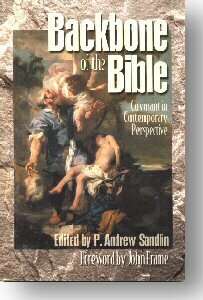

Covenant Media Foundation
Featuring the audio recordings of Dr. Greg L. Bahnsen,
Mp3 downloads along with physical cds,
dvds and books.
Scroll down to see more...............
Backbone of the Bible: Covenant in Contemporary Perspective
P. Andrew Sandlin, ed.
"I am pleased to present and recommend these essays on covenant and justification. They exhibit a high quality of thought on some matters of great importance, and therefore they deserve to be published and to be read with care." - John Frame
What is the Covenant, and Why Is It Controversial?
Questions in the Reformed tradition surrounding the doctrine of the covenant have emerged from almost the very beginning:
Is the covenant unilateral or bilateral? Must justification be understood in the context of covenant, or vice versa? Is covenant faithfulness necessary if one is to expect justification on the Final Day? Is the covenant both eternal and historical, both individual and communal, both gracious and obligatory, and in what senses and to what degrees? Is the covenant a relationship, or merely a way of entering a relationship? To what extent does the prelapsarian (pre-Fall) covenant (if there be one) differ from the postlapsarian covenant? Who are actual covenant members? What is the relation of the church to the covenant? Is there an internal covenant corresponding to an invisible church contrasted with an external covenant corresponding to a visible church? Are all Christian children entitled to both the covenant signs and seals, or only to baptism?
These questions and others have plagued the Reformed tradition for centuries, and they could not have but plagued it, since the doctrine(s!) developed historically over time and did not appear fully framed in even the 17th and 18th centuries.
Recent controversy over the doctrine of the covenant (to which the present volume testifies and will no doubt contribute) is not, therefore, so much a new debate as it is a revival and perpetuation of very old debates. These debates are vital if we (and not only the Reformed) are to arrive at a more accurate understanding of divine truth as it relates to God's dealings with His people and the world. The Bible is unchanged and unchanging (1 Pet. 1:23-25); but doctrine, which is flawed human reflection on the Bible, is dynamic and developing.
This symposium addresses the issues forthrightly and charitably. It is valuable reading for those making their way through the maze of current debates on the doctrine of the covenant.
